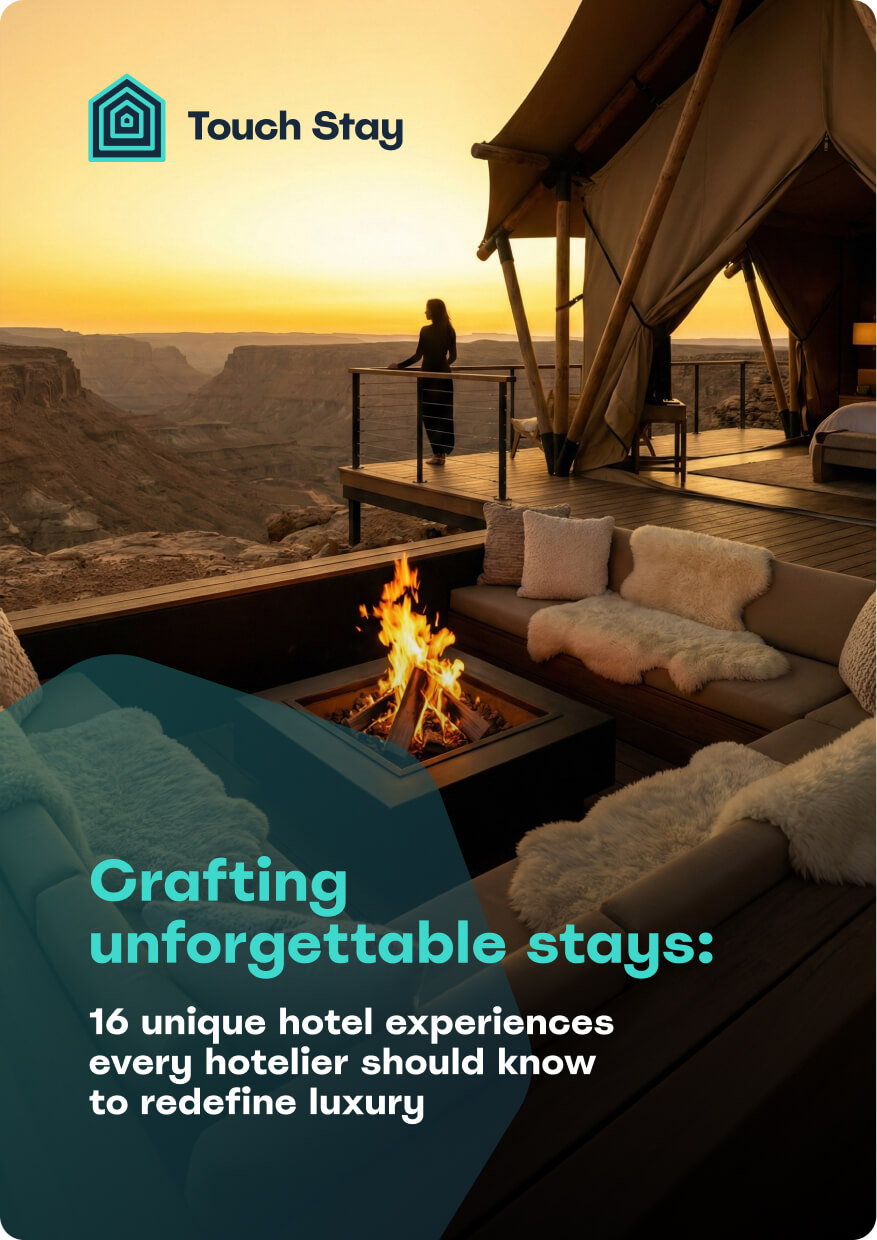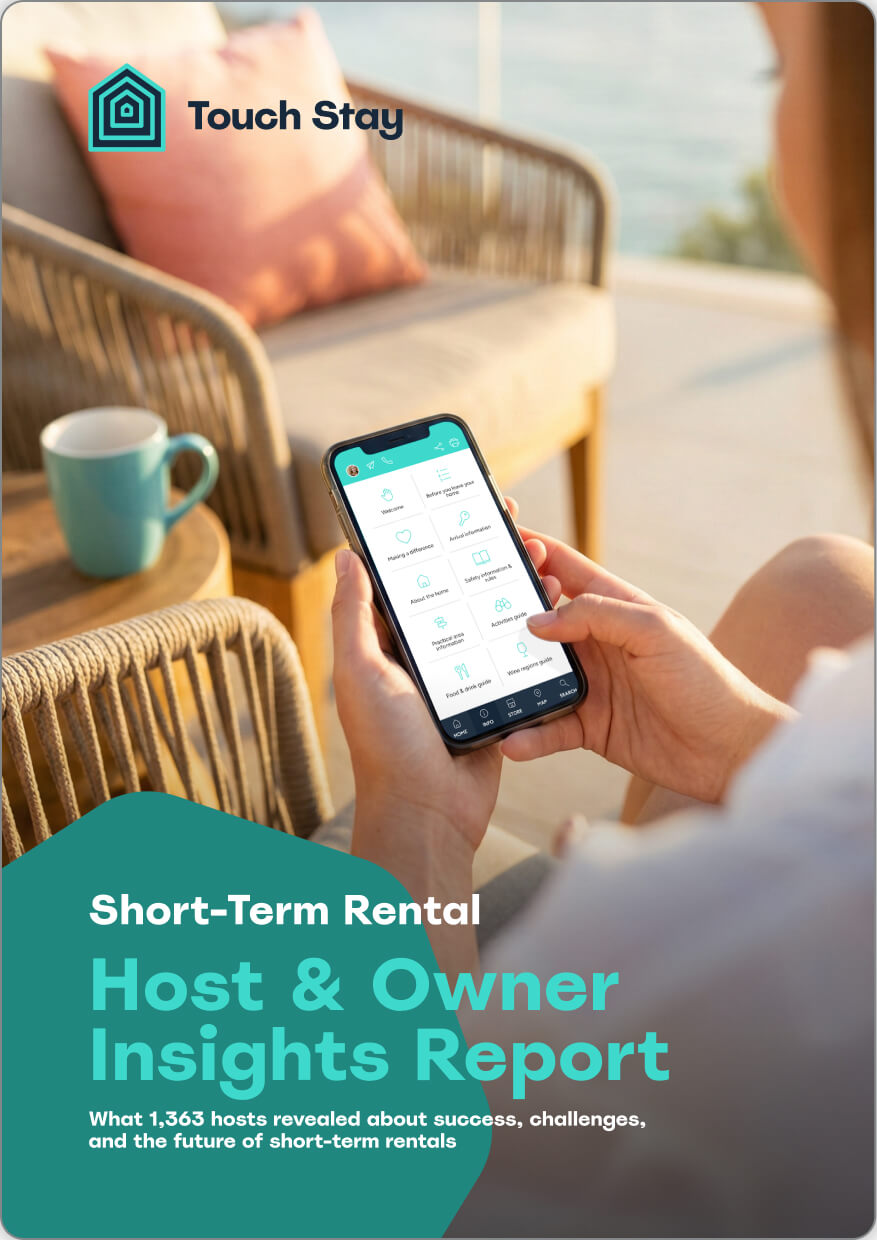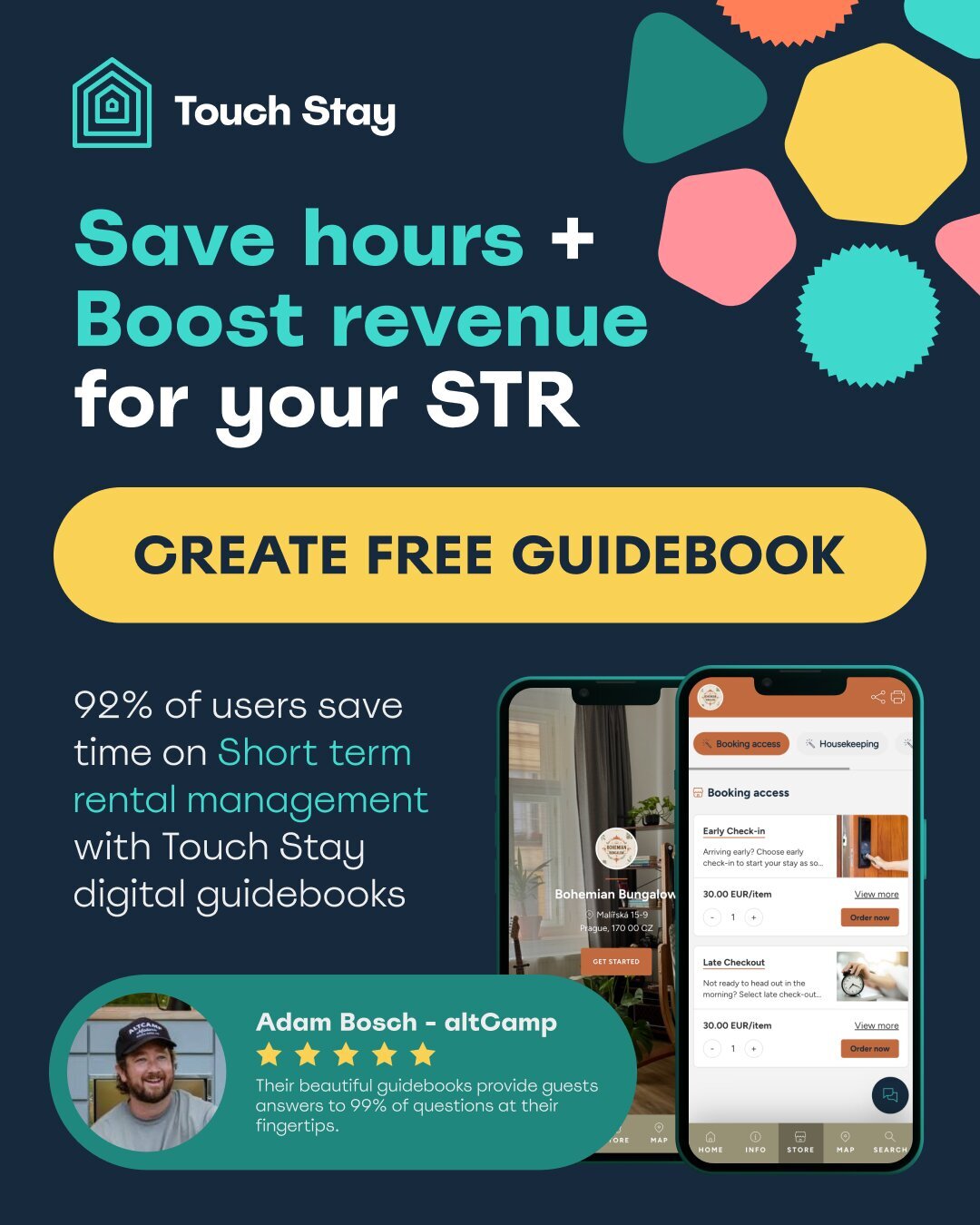With rumblings of a potential recession on the horizon, short term rental hosts and property managers are beginning to turn their attention towards how they can best leverage big booking channels to capture their guests.
Rental Scale Up’s recent online conference: “Are Airbnb, Booking.com, Vrbo, Friends or Foes to Hosts?” delivered ample discussion among industry experts, over the hotly debated topic of online travel agencies (OTAs). Love em’ or hate em’, Airbnb, Booking,com and Vrbo have greatly changed the landscape of the short term rental and hospitality industries.
Whether for better or worse, the debate of OTAs as a friend or foe for hosts and property managers everywhere, was on the docket for this engaging panel featuring Touch Stay CEO, Andy McNulty. He sat down with a number of fellow short term rental industry experts:
- Mark Simpson – Founder of Boostly
- Thibault Masson – Founder of Rental Scale-Up
- Vincent Breslin – Co-Founder of Uplisting
Below, we’ve summarised the conversation for short term rental owners and managers eager to debunk myths surrounding booking direct and big booking platforms, as well as tips and tricks for making OTAs work for you.
WATCH: Rental Scale Up’s “Are Airbnb, Booking.com, Vrbo, Friends or Foes to Hosts?”
The share of OTA bookings is growing
OTA bookings across the five largest platforms jumped from just 44% in 2018, to 60% in 2021.
For smaller niche booking sites, it can be a struggle to get a foothold in the market. Not only does Airbnb dominate supply properties, but they also dominate the traffic. This can make it difficult to compete against giant booking sites, as well as gain exposure for your properties.
OTAs: The Negatives
Hosts don’t often realise how much control OTAs have over them and their properties until something goes wrong. When all your eggs are in one basket, or rather, all your properties are featured strictly on one OTA platform, there’s potential to lose control of your business when things go awry. Whether your review is flagged, or a guest files a complaint, your property can be taken offline in an instant with no advanced warning.
There’s also the matter of associated fee hikes and commission bumps on the part of OTA platforms. By 2023, Airbnb’s revenue is projected to reach $9.5 billion, as OTAs expand their offerings with more hosted experiences and boutique hotel listings. However, with this growth comes the potential for OTAs to increase host pricing as a means to justify owning 60% to 70% of the short term rental industry market.
It’s a blessing but it becomes a curse because you become so over reliant. When 90% of your bookings are coming from one channel, you are literally playing by their rules, and because of that they can change their rules at any time. When you are so reliant on one channel, you are literally at the behest of them.
– Mark
In particular, Airbnb recently introduced new measures given its amendment to the time period a guest may file a complaint. While guests used to only have 24 hours to file a complaint if there was something amiss during their initial stay within their booking, guests now have up to 72 hours to file a complaint. This adds to existing insecurities already felt by new and existing hosts.
OTAs: The Positives
Simply put, OTAs are sometimes more efficient at marketing hosts and properties to potential guests, especially when hosts are seeking exposure to guests from other parts of the country, or even internationally. They also do a thorough job of translating your listing into other languages for the sake of international guests interested in booking with you.
OTAs also do a great job of creating a sense of trust for the guest, not only in ensuring and securing guests’ investment by staying with your property, but also making it easy for guests to carry out bookings and communicate with hosts and potential hosts.
I think it’s down to one thing – love them or hate them, they’ve done a great job of raising awareness of this sector to travellers, and it’s clear they are going to become a more dominant force in later years. It’s a great brand story, which elevates everyone in this industry whether you like them or not.
– Andy
8 ways to make OTAs work for you
During the panel discussions, our experts pointed out several top-notch methods to make OTAs work for you and your short term rentals, not the other way around! Let’s dive in.
1. Remain connected to OTAs
Despite previous warnings in this post about over-reliance on OTAs, it’s important to not detach yourself entirely from OTAs. In fact, it is as dangerous to go 100% book direct as it is to go 100% reliant on OTAs, as you can’t have one without the other.
During certain times of the year such as shoulder season, you will likely find yourself leaning on OTAs more than direct bookings. It’s ultimately about finding a balance between the two. OTAs are efficient in what they offer hosts, but it’s up to hosts as well to optimise their listings on the platforms, monitor their pricing, collect guest reviews, and do everything within their power to increase their rankings.
There’s very few scenarios where hosts and property managers are not using an OTA in some respect to get some bookings. I think the way we kind of think about it, is Airbnb, Booking.com, Vrbo, whatever it is, be on them, but also work on your direct booking strategy. Try and get as many bookings outside of those platforms as possible because you make more money and you’re in control… but detaching yourself entirely from OTAs is very, very difficult. I don’t think that’s realistic for most.
– Vince
2. List properties on multiple channels
Our experts agreed that listing on multiple OTAs is the way to go. Mark noted that while this is viewed as common practice for property owners in Europe, the mindset is different in the United States, where property managers have developed more of a ‘set it and forget it’ mentality, especially with Airbnb.
If you’re relatively new to the short term rental industry, listing your property on multiple channels can seem like a daunting task. That’s where a channel manager can come in handy with our next tip!
3. Use a channel manager
A channel manager lets you oversee and operate all of your properties listed across all OTAs in one convenient location. It also lets you link back to your original listing, meaning less time spent amending multiple properties across multiple sites.
Channel managers also offer long term reporting, highlighting where the majority of traffic is coming from. This enables hosts to focus more time and attention on these areas. Other key insights include competitive analyses on other properties and hosts in your area.
4. Implement dynamic pricing tools
Dynamic pricing tools such as Price Labs and Beyond, also prove beneficial for property managers looking to adjust their pricing in response to a fluctuating economy, or in the event of short term or long term demand.
Placing the responsibility of price setting in the hands of technology, can give new hosts the heevy-jeevies. To this, our experts advised setting a limit to how low you’d be willing to let your pricing go, then let the tool do the rest. In doing so, setting the floor reduces your chance for risk.
5. Own your Google reviews
Achieving direct booking independence from OTAs starts with getting your guests to talk about you and recommend you. Earning your guests’ trust means acquiring reviews for your property on Google, Airbnb, Booking.com and Vrbo. But owning those reviews is another matter entirely.
Make sure you keep [OTAs] at arm’s length – make them work for you, not the other way around and be in control of what you can do.
– Mark
Make your property reviews work for you by featuring them on your direct booking site. Importing your Airbnb, Booking.com and Vrbo reviews is easy to do with tools like Revyoos. Take it one step further by personalising your responses to guest reviews, and promoting your direct booking capabilities within your responses, as well.
6. Optimise your listing
There’s still plenty of opportunity to stand out from the crowd when you list your properties using OTAs. A few suggestions to enhance your listings include:
- Professional, high-quality photos
- Crisp, clear copy highlighting your brand voice
- Brand name and logo within your listing description
This sets your listing apart from Airbnb’s generic branding as part of the platform. Many guests search by a brand name within Airbnb, seek out the host actually running the listing, then book directly with the host on their property’s website. Including your brand name and logo enables guests to find you.
7. Proactively promote your listing
Mark advises being proactive in garnering potential bookings outside of relying on OTAs. Spend five to 30 minutes every day, generating awareness about who you are and the services you offer. This might look like:
- Posting in a Facebook group
- Emailing a previous guest
- Phoning local businesses
No matter how you choose to be proactive, don’t leave your property promotion up to chance – own your marketing when it comes to your vacation rental property.
Be proactive in getting to know your target guest market, as well. Take a step back to research your ideal guest, or your ‘guest avatar’ for your property. This might look like approaching your local destination marketing organisation (DMO) or reviewing prior tourism studies conducted in your city or township. Once you’ve identified the majority of people who are visiting your town or country as a whole, then you determine how to find out where they are located and how you attract them to your region.
Invest now for the future… investment doesn’t have to be money, it’s relationships… building up relationships if you can, so that in years to come when you need a network to lean on, you’ve got a natural network to go to… that would be my one takeaway.
– Andy
8. Reinvest in your business
Regardless of an incoming recession, your success is measured based on the quality of your OTA listings and your website. This not only includes the quality of your property, but the quality of your photos and copywriting within your listing description, as well as the quality of your reviews.
As we saw with short term rentals amidst the onslaught of the pandemic, COVID-19 was predicted to spell disaster for the industry. But short term rentals rebounded, ultimately providing managers and property owners some of the best years for revenue, as well as ample ‘heads on beds’.
As your business continues to grow, and more guests frequent your properties, keep in mind the importance of reinvesting your hard-earned revenue back into your business. Better listing descriptions, better photography, and a better guidebook (a digital one, of course!) means better reviews and happier guests, who can’t wait to return for their next holiday.
Whether you think there’s a recession coming or not, I think there are things you can do now that will allow you to take advantage if that happens and it will allow you to thrive even if it doesn’t.
– Andy
Solidify your property with a Touch Stay digital guidebook
Regardless of an incoming recession or future updates to whichever OTA you may be listed on, Touch Stay has your back thanks to our entirely customisable digital guidebooks. Our easy-to-use templates are built for efficient guest access, no matter their location or connection to the internet. Get started building your Touch Stay digital guidebook with our 14-day free trial today!
Lindsay Stroud
Be the first to know!
Join our newsletter for early access to:
- ✅ Free guides
- ✅ Pro tips & tricks
- ✅ Time saving tutorials
- ✅ Latest blog posts
- ✅ Checklists & templates






















